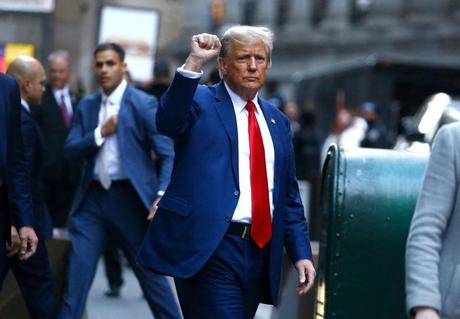On March 4, Donald Trump was scheduled to go on trial in a federal courthouse in Washington DC on criminal charges related to his efforts to overturn the 2020 presidential election.
But the date, which is about a month away, has now been removed from the court's calendar, signaling what has long been expected and what federal prosecutors warned the justices would happen: the former president's efforts to avoid criminal prosecution by claiming 'presidential immunity' have thrown the scheme off course.
It was anything but expected. After Trump's "immunity" defense was shot down by the federal judge overseeing his case, his appeal has effectively stalled the proceedings for the past two months.
An upcoming appeals court decision on whether Trump can claim "immunity" for crimes he is alleged to have committed while in office is likely to be appealed to the U.S. Attorney's Office by Mr. Trump or Special Counsel Jack Smith Supreme Court, depending on how the court rules. Another appeal will further delay the proceedings in an election year when the Republican Party's potential candidate for president faces the prospect of having to sit in four courtrooms to face 91 criminal charges.
That period for opinions from the Washington, D.C.-based appeals court ended Friday morning.
Without the federal election conspiracy trial getting underway in March, Trump could return to New York - where he has already faced two civil trials in recent months - on the next date on the criminal trial calendar.
Nearly a year ago, a grand jury in Manhattan criminally charged Mr. Trump with falsifying corporate records to cover up hush money payments to adult film star Stormy Daniels during the 2016 election.
That trial is scheduled for March 25, although the court in downtown Manhattan postponed the scheduling until the election conspiracy case. New York Judge Juan Merchan will likely determine the court's next step during a preliminary conference on February 15.
The story continues
U.S. District Judge Tanya Chutkan, who has been assigned the Trump election interference case, has scheduled a new trial for April 2, which would have taken place in the middle of Trump's trial. During a hearing this week in an unrelated case, she told the court she suspects there are no trial dates on her calendar in March.
In court filings, Mr. Trump's lawyers have alleged that Mr. Smith's office "never explains" why prosecutors want to stick to the March 4 trial date, which Mr. Trump's lawyers said has "no talismanic significance." .
Federal prosecutors have hinted at the why among the motions and arguments to the judge. The longer the delays, the more likely it is that the case will drag on well beyond 2024, creating an uncomfortable and unprecedented prospect of a newly elected president or a sitting president on trial. And if Trump wins the election, he could order the US Justice Department to close his case altogether.
Mr Smith told the Supreme Court last year that the "immunity issue" requires a "timely resolution to move forward in a case involving criminal prosecution "of paramount importance".
"This case involves - for the first time in our nation's history - criminal charges against a former president based on his actions while in office," lawyers from Mr. Smith's office wrote.
"[Mr Trump] is accused of serious crimes because the grand jury followed the facts and applied the law," she added. "The government is committed to seeking resolution of the immunity claim in this court so that these charges can be resolved immediately, regardless of the outcome."
A federal investigation into Trump's actions surrounding the 2020 election, including a multi-state scheme to overturn the results in states he lost, resulted in a grand jury indictment last year charging him with conspiracy and obstruction.
Prosecutors allege that then-President Trump relied on deliberately false claims about the election to pressure state officials to approve fraudulent voter rolls to hinder the certification of the results, and then tried to convince his then-Vice President Mike Pence to refuse the outcome, and ultimately failed to stop a mob of his supporters from entering the U.S. Capitol and doing so by force.
On December 1, the federal judge overseeing the case threw out his "immunity defense," ruling that Trump's single term in office did not grant him "the divine right of kings" to avoid criminal liability.

"The United States has only one Chief Executive at a time, and that position does not confer the right to a lifetime get-out-of-jail sentence," Judge Chutkan wrote. "The exposure of a former president to federal criminal liability is essential to fulfilling our constitutional promise of equal justice under the law."
Trump appealed the decision, and his legal team argued before a three-judge panel earlier this month to overturn Judge Chutkan's ruling.
Appeals Court Judge Florence Henderson, appointed by Republican President George W. Bush, argued that "it is paradoxical to say that his constitutional duty to ensure that the laws are faithfully executed allows him to violate criminal law ".
It is unclear when the appeals court will issue a ruling, which will almost certainly be appealed by both sides depending on how the court rules.
If appellate judges reject Trump's claims, his lawyers could request a new hearing with a full panel of appellate judges or take the case to the Supreme Court.
The justices there are already set to discuss another key constitutional issue involving his efforts to undermine the 2020 election.
On Feb. 8, justices will hear oral arguments in a case that will determine whether he can be disqualified from holding public office under the scope of the 14th Amendment, which bans anyone who has sworn an oath to uphold the Constitution and "engages in insurrection or rebellion. of holding public office.
